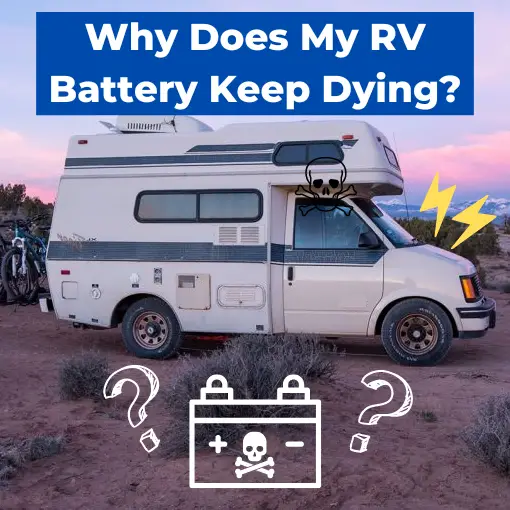Recreational vehicles (RVs) are a popular choice for travel enthusiasts who want to enjoy the convenience and comfort of a home on wheels. As an RV owner, it’s important to be aware of potential issues that can arise, such as a dying battery. A consistently dying battery can lead to the disruption of essential electrical components in the RV and can even pose safety risks. So why does your RV battery keep dying?
Overcharging is one of the most common reason why an RV battery keeps dying, as it can lead to overheating and damage the internal components of the battery. Other culprits can be sulfation, parasitic loads, self-discharging, undercharging, and lack of maintenance.
Each of these issues can be addressed and fixed to ensure the longevity of your battery and consistent performance of your RV. Proper maintenance and a better understanding of the causes behind a dying RV battery can help extend battery life and avoid frustrating travel interruptions.
By identifying and addressing the potential factors contributing to the issue, RV owners can avoid the inconvenience of a constantly dying battery and focus on what’s really important – enjoying their adventures on the open road. In this article, we’ll discuss the common reasons why an RV battery keeps dying and provide tips on how to rectify these issues.
The Main Reasons Your RV Battery Keeps Dying
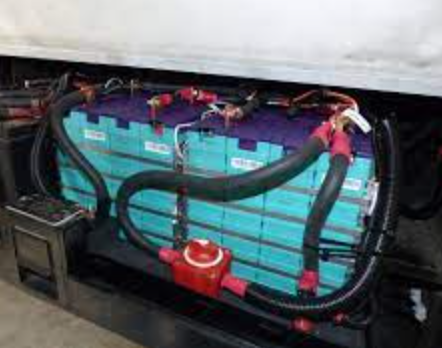
Overcharged RV Battery
An overcharged RV battery can be a significant reason for its premature failure. When a 12-volt lead-acid battery is left on a charger for too long after reaching its maximum charge, it can overheat. This damages the components inside, leading to fluidic acid loss, and even causing acid to be expelled from the battery case.
RV Battery Wasn’t Charged Long Enough
Undercharging your RV battery can also lead to a shortened battery life. If the battery isn’t charged long enough or fully, it can cause sulfation and reduce its capacity.
RV Battery Was Overdrained
RV batteries can be damaged by overdraining beyond their capacity. When the battery is drained too much, it becomes challenging to recharge, leading to a lower usable capacity and eventually a dead battery.
RV Battery Sulfation
Sulfation is a common cause of RV battery failure, which occurs when the battery isn’t charged fully or is left in a discharged state for an extended period. Sulfation is the formation of lead sulfate crystals on the battery plates, reducing its capacity and, in severe cases, rendering it useless.
RV Battery Needs To Be Replaced
Over time, any RV battery will degrade naturally and will need to be replaced. Regular maintenance and proper charging practices can extend the lifespan of your RV battery, but eventually it will reach the end of its service life and will need to be replaced.
Battery Charging and Maintenance
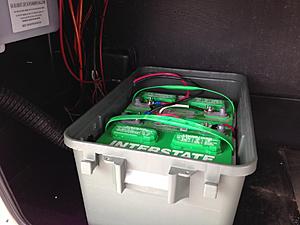
Proper Charging Techniques
Proper charging techniques are essential for prolonging the life of an RV battery and ensuring its peak performance. Charging an RV battery involves two primary stages: the bulk charge and the float charge.
In the bulk charge stage, it’s crucial to provide a constant current to the battery until it reaches about 80% of its capacity.
Next, in the float charge stage, the current should be gradually reduced while maintaining a constant voltage until the battery is fully charged.
Avoid overcharging and undercharging the battery, as these can result in damage, reduced efficiency, and shorter battery life.
Maintaining Electrolyte Levels
For lead-acid batteries, maintaining proper electrolyte levels is vital to their performance and longevity.
Regularly check the electrolyte levels in the battery cells and replenish them with distilled water when necessary. This prevents exposure of the battery plates to air, which can lead to sulfation. Additionally, make sure not to overfill the cells, as this can lead to overflow and damage to the electrical system.
Checking for Corrosion
Corrosion on the battery terminals and connections can negatively impact the performance of the electrical system, leading to issues like difficulty charging or rapid discharges.
Inspect the battery terminals and connectors regularly and clean them with a battery terminal cleaner or a solution of baking soda and water to remove any corrosion. This will help maintain proper voltage and ensure optimal performance of the RV battery.
Addressing Sulfation and Voltage Issues
Sulfation is a common problem in lead-acid batteries that occurs when sulfate crystals build up on the battery plates, reducing their capacity to hold a charge. To prevent sulfation, try to maintain a consistent state of charge and avoid deep discharges.
If you notice that your battery’s performance is declining significantly, it may be necessary to invest in a battery desulfator to help reverse the effects of sulfation.
Regularly checking your RV battery’s voltage is another crucial aspect of maintaining its health. Use a multimeter to measure the voltage and ensure that it stays within the recommended range for your specific battery type.
This will help prevent issues like undercharging or overcharging, which can damage the battery and decrease its lifespan.
By following these battery charging and maintenance guidelines, you can help extend the life of your RV battery and improve its performance, ultimately reducing the risk of it dying unexpectedly.
Reasons for RV Battery Draining Quickly
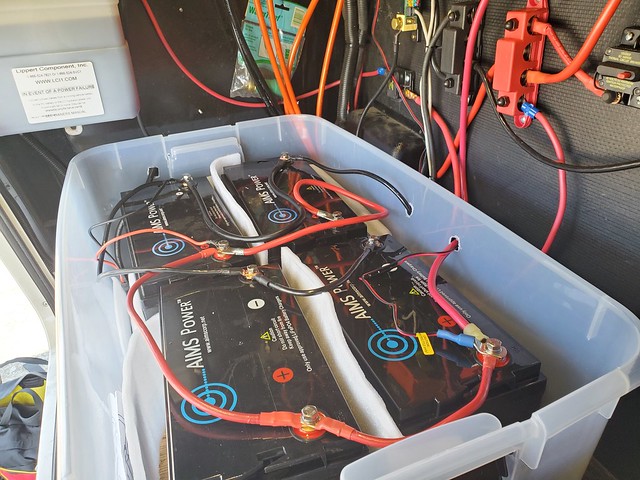
Parasitic Loads
Parasitic loads are the constant drain on an RV battery from devices that remain active even when not in use, such as smoke detectors, carbon monoxide detectors, clocks, and radios.
These loads are typically small, but over time, they can significantly impact your RV battery’s ability to hold a charge.
Appliance Usage and Power Draw
Appliance usage inside your RV affects the battery’s charge. High power consuming items, such as lights, refrigerators, TVs, microwaves, and other appliances, can drain the battery quickly if used excessively or simultaneously. Ensure you monitor your overall power draw and avoid using high-energy appliances for extended periods.
Battery Self-Discharging
An RV battery naturally self-discharges over time, even without any external power draw. This self-discharge rate can be increased by factors such as lack of use and colder weather conditions, leading to a quicker loss of power.
To minimize the impact of self-discharging, make sure to regularly use and charge your RV battery.
Lack of Use and Storage Conditions
An RV battery can suffer from a lack of use, which often occurs during extended periods of storage. Extended storage in colder weather can lead to increased self-discharge rates and additional strain on the battery.
Ensuring proper storage conditions and regularly using or charging the battery even when in storage can help maintain its overall health and longevity.
Types of RV Batteries and Their Lifespan
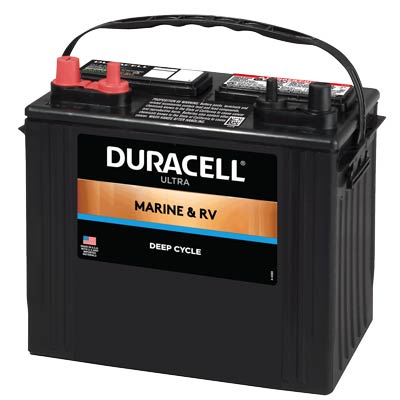
When it comes to RV batteries, it’s essential to understand the different types available to ensure you get the best performance and lifespan for your RV’s electrical system.
In this section, we’ll discuss three main types of RV batteries: Lead-Acid Batteries, Lithium-Ion Batteries, and Gel Batteries.
Lead-Acid Batteries
Lead-acid batteries are the most common type of RV house batteries. They are primarily built as deep cycle batteries, designed to discharge and recharge repeatedly without causing significant damage to the battery life.
Lead-acid RV batteries typically last for 3-5 years, depending on usage, maintenance, and environmental conditions.
Regular maintenance, such as checking the electrolyte levels and ensuring proper charging, can help extend their lifespan. However, they can be affected by sulfation, parasitic loads, and overcharging, which could contribute to the battery dying sooner than expected.
Lithium-Ion Batteries
Lithium-ion batteries are another popular choice for RV house batteries. They offer significant advantages over other types of batteries, such as being lighter in weight, requiring less maintenance, and having a longer lifespan. These batteries can typically last 5-10 years or more, even with regular use.
Lithium-ion batteries are less susceptible to the issues that can plague lead-acid batteries, like sulfation and overcharging, making them a more reliable choice for powering an RV’s electrical system.
Gel Batteries
Gel batteries are a subtype of lead-acid batteries and are often used in RVs for specific applications. They differ from regular lead-acid batteries in that they use a gel electrolyte rather than a liquid one. This design helps prevent leaks and makes them more resistant to vibrations and temperature fluctuations.
Gel batteries typically have a slightly longer lifespan than standard lead-acid batteries, usually lasting between 4-6 years. Proper maintenance and charging, along with careful usage patterns, can help extend the life of these batteries.
Alternative Charging Solutions
Maintaining a healthy RV battery requires some attention and care. This section explores different charging solutions to help keep your RV battery working optimally.
Solar Panel Systems
Solar panel systems can be a great way to ensure your RV battery stays charged, especially if you plan on spending extended periods off-grid1. Depending on the solar system’s size, it may be able to provide enough energy to power your essential devices without draining the battery.
It’s important to choose an appropriate solar panel system and accompanying charge controller for your RV’s specific needs. Keep in mind that the efficiency of solar panels can be affected by factors such as cloud cover and geographic location.
Shore Power
Hooking up your RV to shore power when it’s available can prevent battery overuse and help maintain its charge2. Shore power offers a consistent source of electricity, allowing you to use your electrical devices in the RV without depending on the battery.
Most RV parks and campgrounds offer shore power connections, so it’s a convenient and reliable way to keep your battery charged.
Trickle Chargers
Trickle chargers are designed to slowly and consistently recharge your RV battery, preventing it from becoming overcharged. A trickle charger is connected to your battery while the RV is in storage or when you’re not using it for an extended period. This type of charger monitors the battery’s voltage and provides a maintainer effect to keep it at optimal levels. Note that trickle chargers are not meant for fast charging but rather for maintaining your battery’s charge.
Battery Tenders
Battery tenders work similarly to trickle chargers but can be a more advanced solution to maintaining your RV battery. A battery tender uses a microprocessor to analyze the battery’s charge level and provide the appropriate charging voltage.
This means it can switch between float mode, absorption mode, and bulk mode to fit the battery’s specific needs. Battery tenders are an excellent option for ensuring your RV battery stays charged and healthy, especially during long-term storage or when extra maintenance is required.
Tips to Prevent RV Battery Failure
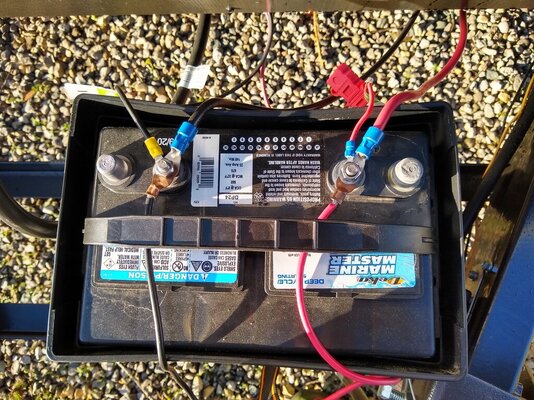
This section provides helpful tips and advice on how to prevent your RV battery from dying. The recommendations are categorized into three sub-sections: Regular Use and Conditioning, Proper Storage Techniques, and Monitoring and Routine Inspections.
Regular Use and Conditioning
Using your RV battery regularly helps maintain its energy levels and prolongs its lifespan. It is essential to conduct proper maintenance and care to avoid battery failure. Make sure to:
- Avoid deep discharges (below 50% charge)
- Charge the battery fully before storing it
- Periodically check the battery’s electrolyte levels
- Clean any corrosion buildup on terminals and wiring
Regular conditioning also extends the battery’s life. For different battery types, make sure to follow appropriate measures. For example, lead-acid batteries benefit from equalization charging to balance the cells and prevent sulfation.
Proper Storage Techniques
Proper storage of your RV battery is crucial to ensure its longer lifespan and avoid damage. Here are some storage methods to consider:
- Remove the battery from the RV during long periods of non-use
- Keep the battery in a cool, dry place with a stable temperature
- Disconnect the ground wire to avoid parasitic loads
- Use a battery tender or a solar panel with a charge controller to maintain the charge
When storing the RV, unplug any power-hungry appliances like refrigerators to reduce power draw and ensure minimal discharge.
Monitoring and Routine Inspections
Regular monitoring and inspections help identify potential issues with the RV battery before they turn into significant problems. Some crucial checks include:
- Inspect the wiring and connections for any damages or wear
- Examine the battery terminals for corrosion or loose contacts
- Check the electrolyte levels and refill if necessary
- Measure the voltage to ensure it is within the recommended range
- Test the max charge and capacity of the battery
Keeping a close eye on your RV battery, along with proper maintenance, will help prevent unexpected failures and ensure a hassle-free RVing experience.

